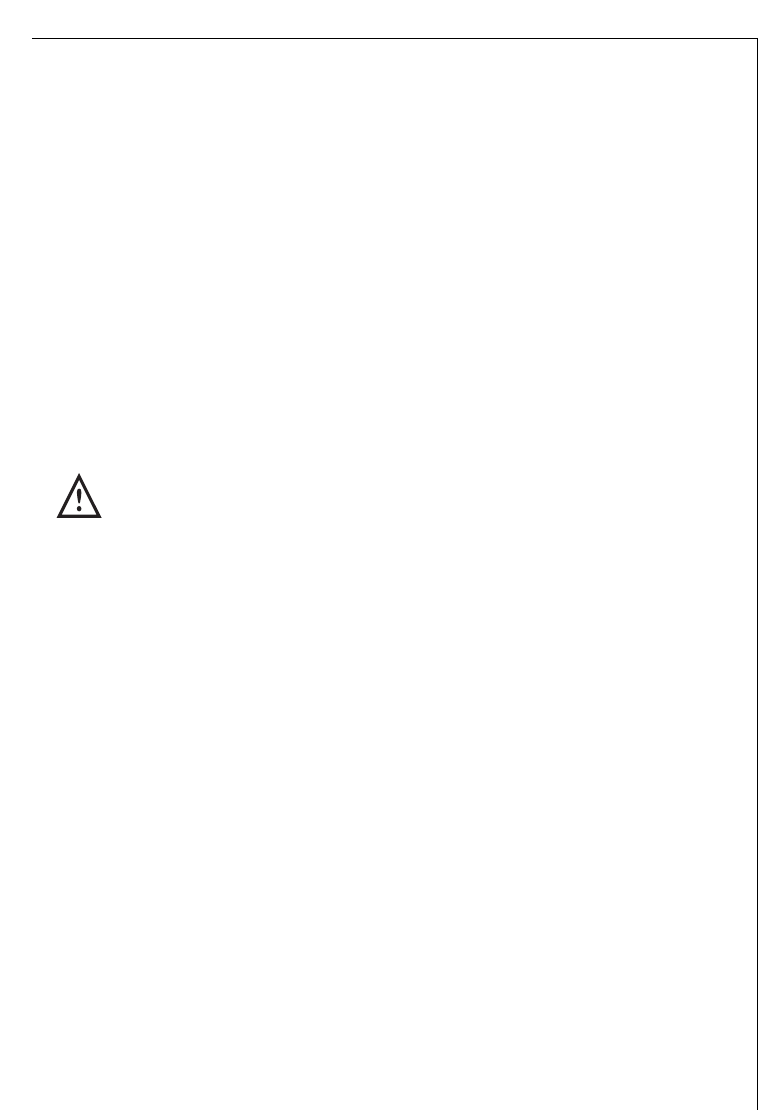
11
Frozen food Symbols/Freezing Calendar
• The symbols on the drawers show different types of frozen goods.
• The numbers indicate storage times in months for the appropriate
types of frozen goods. Whether the upper or lower value of the indi-
cated storage time is valid depends on the quality of the foods and
pre-treating before freezing. The lower value applies to foods with
high fat content.
Preparation of Ice Cubes
1. Fill the ice cube tray 3/4 full with cold water, place it in the freezer com-
partment and leave to freeze.
2. To loosen the frozen cubes, either bend the ice cube tray or hold it under
running water for a few seconds.
Important! Never try to free an ice tray that is frozen to the freezer com-
partment using pointed or sharp edged objects. Use the ice scraper supplied.
Defrosting
Refrigerator
Frost is automatically eliminated from the evaporator of the refrigerator
compartment every time the motor compressor stops, during normal use.
The defrost water drains out through a trough into a special container at
the back of the appliance, over the motor compressor, where it evaporates.
Freezer
The freezer compartment, however, will become progressively covered with
frost. This should be removed with the special plastic scraper provided,
whenever the thickness of the frost exceeds 4 mm. During this operation it
is not necessary to switch off the power supply or to remove the foodstuffs.
14
Symptom Possible Cause Remedy
Appliance does not work.
Appliance is not switched on Switch on the appliance.
Mains plug is not plugged in or
is loose.
Insert mains plug.
Fuse has blown or is defective. Check fuse, replace if necessary.
Socket is defective.
Mains malfunctions are to be
corrected by an electrician.
Appliance cools too much. Temperature is set too cold.
Turn the temperature regulator
to a warmer setting.
Something Not Working
If the appliance is not functioning correctly, please carry out the fol-
lowing checks before contacting your local AEG Service Force Centre.
Warning!
Repairs should only be carried out by qualified service engineers. Repairs
carried out by inexperienced persons may cause injury or serious malfunc-
tioning.
Energy Saving Tips
• Do not install the appliance near cookers, radiators or other sources of
continuous warmth. High ambient temperatures cause longer, more fre-
quent operation of the compressor.
• Ensure sufficient air circulation at the appliance base and at the back wall
of the appliance. Never cover air vent openings.
• Do not place warm foods into the appliance. Allow warm foods to cool
first.
• Do not leave the door open any longer than necessary.
• Do not set temperature any colder than necessary.
• Put frozen food in the fridge to defrost. The cold in the frozen food will
then be used to cool the fridge.
Accumulation of dust on the condenser increases energy consumption. For
this reason carefully clean the condenser at the back of the appliance once
a year with a soft brush or a vacuum cleaner. Ensure the appliance is
switched off.


















